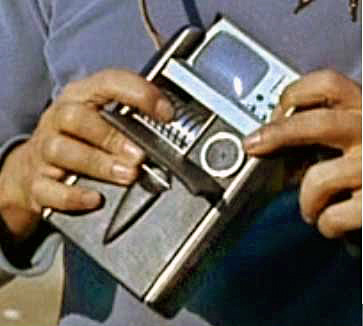Science Fiction
Dictionary
A B C D E F G H I J K L M N O P Q R S T U V W X Y Z
SCiO Scanner Wants You To Be Spock

The SCiO device contains a tiny spectrometer which, in concert with your iPhone and the SCiO cloud, can determine the composition of materials. Or so they claim.
(SCiO handheld device)
SCiO is based on the proven near-IR spectroscopy method. The physical basis for this material analysis method is that each type of molecule vibrates in its own unique way, and these vibrations interact with light to create a unique optical signature.SCiO includes a light source that illuminates the sample and an optical sensor called a spectrometer that collects the light reflected from the sample. The spectrometer breaks down the light to its spectrum, which includes all the information required to detect the result of this interaction between the illuminated light and the molecules in the sample.
Spectrometers used for near-IR spectroscopy are normally found in scientific laboratories and are very big and expensive. Designed for consumers, SCiO leverages a tiny spectrometer, designed from the ground up to be mass-produced at low cost. Consumer Physics achieved this advancement by reinventing the spectrometer around low-cost optics and advanced signal processing algorithms.
To deliver relevant information in real time, SCiO communicates the spectrum of the sample to a smartphone wirelessly, which in turn forwards it to a cloud-based service for review. Advanced algorithms utilize an updatable database to analyze the spectrum within milliseconds and deliver information about the analyzed sample back to the user's smartphone in real time.
Many of us remember the tricorder from the original Star Trek series of the mid-1960's. The standard Starfleet tricorder was used for determining various characteristics of landing areas (like life form readings). (Doctors and engineers had their own specific types of tricorder.)
The SCiO device has the additional requirement that people interact with their cloud to help them make their cloud smarter. It kind of reminds me of Ava, an AI from a pretty cool novel The Calcutta Chromosome published in 1995. Ava used people to answer questions endlessly about every last piece of junk it encountered. The SCiO cloud might be a bit like that. That's why I think it wants you to be Spock; you roam around and whenever it doesn't know something, it will want you to provide more data.
Apparently, you can pre-order one of these little beauties now.

(Spock's Tricorder - Detail)
For other news related to sensors and science fiction, see EyeBall: Omni-Directional Smart Eye Sensor and ThereminVision Sensor: Robot Proximity Detection.
Scroll down for more stories in the same category. (Story submitted 1/27/2016)
Follow this kind of news @Technovelgy.| Email | RSS | Blog It | Stumble | del.icio.us | Digg | Reddit |
Would
you like to contribute a story tip?
It's easy:
Get the URL of the story, and the related sf author, and add
it here.
Comment/Join discussion ( 0 )
Related News Stories - (" Engineering ")
Can One Robot Do Many Tasks?
'... with the Master-operator all you have to do is push one! A remarkable achievement!' - Robert Sheckley, 1952.
Roborock Saros Z70 Is A Robot Vacuum With An Arm
'Anything larger than a BB shot it picked up and placed in a tray...' - Robert Heinlein, 1956.
Secret Kill Switch Found In Yutong Buses
'The car faltered as the external command came to brake...' - Keith Laumer, 1965.
The Desert Ship Sailed In Imagination
'Across the ancient sea floor a dozen tall, blue-sailed Martian sand ships floated, like blue smoke.' - Ray Bradbury, 1950.
Technovelgy (that's tech-novel-gee!) is devoted to the creative science inventions and ideas of sf authors. Look for the Invention Category that interests you, the Glossary, the Invention Timeline, or see what's New.
Science Fiction
Timeline
1600-1899
1900-1939
1940's 1950's
1960's 1970's
1980's 1990's
2000's 2010's
Current News
The New Habitable Zones Include Asimov's Ribbon Worlds
'...there's a narrow belt where the climate is moderate.'
Can One Robot Do Many Tasks?
'... with the Master-operator all you have to do is push one! A remarkable achievement!'
Atlas Robot Makes Uncomfortable Movements
'Not like me. A T-1000, advanced prototype. A mimetic poly-alloy. Liquid metal.'
Boring Company Drills Asimov's Single Vehicle Tunnels
'It was riddled with holes that were the mouths of tunnels.'
Humanoid Robots Tickle The Ivories
'The massive feet working the pedals, arms and hands flashing and glinting...'
A Remarkable Coincidence
'There is a philosophical problem of some difficulty here...'
Cortex 1 - Today A Warehouse, Tomorrow A Calculator Planet
'There were cubic miles of it, and it glistened like a silvery Christmas tree...'
Perching Ambush Drones
'On the chest of drawers something was perched.'
Leader-Follower Autonomous Vehicle Technology
'Jason had been guiding the caravan of cars as usual...'
Golf Ball Test Robot Wears Them Out
"The robot solemnly hit a ball against the wall, picked it up and teed it, hit it again, over and again...'
Boring Company Vegas Loop Like Asimov Said
'There was a wall ahead... It was riddled with holes that were the mouths of tunnels.'
Rigid Metallic Clothing From Science Fiction To You
'...support the interior human structure against Jupiterís pull.'
Is The Seattle Ultrasonics C-200 A Heinlein Vibroblade?
'It ain't a vibroblade. It's steel. Messy.'
Roborock Saros Z70 Is A Robot Vacuum With An Arm
'Anything larger than a BB shot it picked up and placed in a tray...'
A Beautiful Visualization Of Compact Food
'The German chemists have discovered how to supply the needed elements in compact, undiluted form...'
Bone-Building Drug Evenity Approved
'Compounds devised by the biochemists for the rapid building of bone...'
